India may officially surpass China in its growth rate as it is now leading major emerging economies in growth chart.
India may officially surpass China in its growth rate as it is now leading major emerging economies in growth chart, according to latest World Bank figures.
“With an expected growth of 7.5 per cent this year, India is, for the first time, leading the World Bank’s growth chart of major economies,” said Kaushik Basu, World Bank Chief Economist and Senior Vice President after the release of the latest Global Economic Prospects (GEP) report on Wednesday.
China is projected to grow at 7.1 per cent. Developing countries are now projected to grow by 4.4 per cent this year, with a likely rise to 5.2 per cent in 2016, and 5.4 per cent in 2017, the report said.
In China, the carefully managed slowdown continues, with growth likely to moderate to a still robust 7.1 per cent this year. In India, which is an oil importer, reforms have buoyed confidence and falling oil prices have reduced vulnerabilities, paving the way for the economy to grow by a robust 7.5 per cent rate in 2015, the report said.
Basu said slowly but surely the ground beneath the global economy is shifting. “China has avoided the potholes skillfully for now and is easing to a growth rate of 7.1 per cent; Brazil, with its corruption scandal making news, has been less lucky, dipping into negative growth,” he said.
The main shadow over this moving landscape is of the eventual US liftoff, he noted.
Growth in South Asia is expected to continue firming to 7.1 per cent this year, led by a cyclical recovery in India and supported by a gradual strengthening of demand in high-income countries.
The decline in global oil prices has been a major benefit for the region, driving improvements in fiscal and current accounts, enabling subsidy reforms in some countries, and the easing of monetary policy, the report said.
In India, new reforms are improving business and investor confidence and attracting new capital inflows, and should help raise growth to 7.5 per cent this year.
According to the report, developing nations face a series of tough challenges in 2015, including the looming prospect of higher borrowing costs as they adapt to a new era of low prices for oil and other key commodities, resulting in a fourth consecutive year of disappointing economic growth this year.
“Developing countries were an engine of global growth following the financial crisis, but now they face a more difficult economic environment,” said World Bank Group President Jim Yong Kim.
